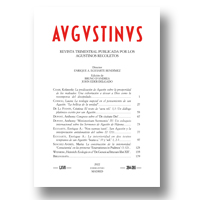|
|
|
21.
|
Augustinus:
Volume >
66 >
Issue: 260/261
Pablo Irizar
La imagen de Dios como mito del origen:
Un ensayo crítico de la investigación actual sobre la interpretación de Agustín del texto de Gn 1, 26 (387-400)
abstract |
view |
rights & permissions
| cited by
This essay offers a critical survey of recent research into Augustine’s interpretation of Gn 1.26. The first part contextualizes the discussion within the broader landscape of world creation narratives and origin myths. Against this background, the second part analyzes recent learned discussion on Augustine’s (anti-Manichean) interpretation of Gn 1.26 for the period 387-400. By way of preface, the study offers a concise state of the art on the study of Gn 1.26 in the work of Augustine. The survey suggests the image of God functions as an origin myth during the period in question. The conclusion suggests exploring the neglected communal embedding of Augustine’s interpretation of Gn 1:26 as a fruitful venue for future research.
|
|
|
|
|
|
|
22.
|
Augustinus:
Volume >
66 >
Issue: 260/261
Kolawole Chabi
Espiritualidad eucarística en los Sermones de Pascua de san Agustín
abstract |
view |
rights & permissions
| cited by
This article studies Augustine’s Eucharistic Spirituality as it emerges from primarily from his preaching, in his catechesis during the Easter Season. It investigates how the bishop of Hippo explains the transformation that makes bread and wine into the Body and Blood of Christ to the neophytes. It further considers the spiritual disposition necessary for the reception of the sacrament and its effects in the life of those who worthily share in the Sacred Banquet. Finally, the article explores the link Augustine establishes between the Eucharist and the Church to demonstrate the importance of Unity among those who approach the altar of the Lord.
|
|
|
|
|
|
|
23.
|
Augustinus:
Volume >
66 >
Issue: 260/261
Paola Marone
La metáfora de la 'ecclesia mater' en la literatura antidonatista
abstract |
view |
rights & permissions
| cited by
The modern scholars have studied the maternity of the Church independently from the anti-Donatist literature. But a careful study of the anti-Donatist documents reveals many interesting elements. According to Optatus and Augustine the notion of mother was abscribed to all believers, because the body of Christ was formed of all those the Church bore as children through the baptism. According to both African bishops also the donatists gave a valid baptism, but only Augustine demonstrated how the salvation could be found outside of the viscera Ecclesiae. Then this article deals with the image of the Ecclesia mater as illustrated in the Adversus Donatistas of Optatus published in answer to the donatist bishop Parmenianus and in all that Augustine penned against the schismatics (Tractatus, Sermones, Epistulae). By doing so, it presents a picture of the African theology of the fourth century.
|
|
|
|
|
|
|
24.
|
Augustinus:
Volume >
66 >
Issue: 260/261
Joost Van Neer
La construcción de la fe en Agustín. Los dos modelos de discurso en el 'De catechizandis rudibus' de Agustín
abstract |
view |
rights & permissions
| cited by
Augustine’s 'De catechizandis rudibus' consists of two sections: a theoretical section and a practical section. In the practical section the guidelines given in the theoretical section are illustrated by means of two model speeches, a longer one and a shorter one. It is commonly thought that the shorter speech is an abbreviated version or a summary of the longer speech. In this article I aim to show that this is not the case. Although a study of the structure of the speeches shows that both are set up the same way in accordance with the guidelines given, the tenor of the speeches is markedly different. Listening to the shorter speech does not impart the same information as listening to the longer speech.
|
|
|
|
|
|
|
25.
|
Augustinus:
Volume >
66 >
Issue: 260/261
Marius A. Van Willigen
El 'De paradiso' de Ambrosio: una fuente de inspiración para Agustín de Hipona
abstract |
view |
rights & permissions
| cited by
The theological influence of Ambrose of Milan on Augustine is often underestimated. Some of this influence is demonstrated in this short case-study bymeans of a rather direct question: Did Augustine use Ambrose’s 'De paradiso' in 'De peccato originali'?
|
|
|
|
|
|
|
26.
|
Augustinus:
Volume >
66 >
Issue: 260/261
Bibliografía
view |
rights & permissions
| cited by
|
|
|
|
